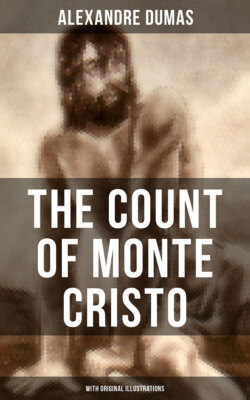Читать книгу The Count of Monte Cristo (With Original Illustrations) - Alexandre Dumas - Страница 94
На сайте Литреса книга снята с продажи.
Original
ОглавлениеTo the elegance of a nervous and slight form had succeeded the solidity of a rounded and muscular figure. As to his voice, prayers, sobs, and imprecations had changed it so that at times it was of a singularly penetrating sweetness, and at others rough and almost hoarse. Moreover, from being so long in twilight or darkness, his eyes had acquired the faculty of distinguishing objects in the night, common to the hyena and the wolf. Edmond smiled when he beheld himself: it was impossible that his best friend—if, indeed, he had any friend left—could recognize him; he could not recognize himself.
The master of The Young Amelia, who was very desirous of retaining amongst his crew a man of Edmond's value, had offered to advance him funds out of his future profits, which Edmond had accepted. His next care on leaving the barber's who had achieved his first metamorphosis was to enter a shop and buy a complete sailor's suit—a garb, as we all know, very simple, and consisting of white trousers, a striped shirt, and a cap. It was in this costume, and bringing back to Jacopo the shirt and trousers he had lent him, that Edmond reappeared before the captain of the lugger, who had made him tell his story over and over again before he could believe him, or recognize in the neat and trim sailor the man with thick and matted beard, hair tangled with seaweed, and body soaking in seabrine, whom he had picked up naked and nearly drowned. Attracted by his prepossessing appearance, he renewed his offers of an engagement to Dantes; but Dantes, who had his own projects, would not agree for a longer time than three months.
The Young Amelia had a very active crew, very obedient to their captain, who lost as little time as possible. He had scarcely been a week at Leghorn before the hold of his vessel was filled with printed muslins, contraband cottons, English powder, and tobacco on which the excise had forgotten to put its mark. The master was to get all this out of Leghorn free of duties, and land it on the shores of Corsica, where certain speculators undertook to forward the cargo to France. They sailed; Edmond was again cleaving the azure sea which had been the first horizon of his youth, and which he had so often dreamed of in prison. He left Gorgone on his right and La Pianosa on his left, and went towards the country of Paoli and Napoleon. The next morning going on deck, as he always did at an early hour, the patron found Dantes leaning against the bulwarks gazing with intense earnestness at a pile of granite rocks, which the rising sun tinged with rosy light. It was the Island of Monte Cristo. The Young Amelia left it three-quarters of a league to the larboard, and kept on for Corsica.
Dantes thought, as they passed so closely to the island whose name was so interesting to him, that he had only to leap into the sea and in half an hour be at the promised land. But then what could he do without instruments to discover his treasure, without arms to defend himself? Besides, what would the sailors say? What would the patron think? He must wait.
Fortunately, Dantes had learned how to wait; he had waited fourteen years for his liberty, and now he was free he could wait at least six months or a year for wealth. Would he not have accepted liberty without riches if it had been offered to him? Besides, were not those riches chimerical?—offspring of the brain of the poor Abbe Faria, had they not died with him? It is true, the letter of the Cardinal Spada was singularly circumstantial, and Dantes repeated it to himself, from one end to the other, for he had not forgotten a word.
